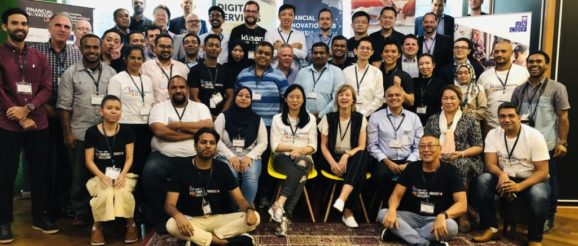Attracting Fintechs to the Pacific; lessons from an Innovation Challenge — PFIP

August 23, 2019
Recently I joined my former colleagues at the Pacific Financial Inclusion Programme (PFIP) to support their Pacific-ASEAN Financial Innovation Challenge. In this Challenge, four specific challenges from the Pacific were presented to Fintech companies from the Pacific and the ASEAN region. These cases were carefully developed together with private sector partners from the Programme. All are well established financial service providers with a keen interest to deliver new innovative solutions for low-income and under-served Pacific Islanders.
The participating technology companies would be linked to one of the cases from these financial service providers right from the start, ensuring ownership and responsibility from all stakeholders involved. Something that is often a considerable setback in many other open challenges, where technology firms are expected to define their specific market segments and find their own partners.
The Challenge started off with a call for applications end of February this year through which more than 120 applications were received. After a rigorous selection process, we invited thirteen technology companies to pitch their solutions at a bootcamp in Kuala Lumpur during the month of May. Four of these have now made it to the acceleration phase and are now working with our partners to develop, test, iterate and pilot the solutions in Fiji, Vanuatu and Papua New Guinea.
Below I would like to share with you some of the more interesting and unexpected insights that we have gathered so far during the implementation of this Innovation Challenge.
Are we branding for the target audience?
The main objective of this Innovation Challenge was to derisk the entry of ASEAN based Fintechs into the Pacific region. Fintechs who can provide proven solutions for the challenges faced on the ground by PFIP’s four selected private sector partners in the Pacific.
It turned out that it was a challenge in its own right to get technical solution providers interested to even apply for the Innovation Challenge. To face this issue head-on a lot of effort was put in by directly contacting and engaging with these tech firms one-on-one in Kuala Lumpur, Singapore and Australia. Through this approach, we managed to persuade a good number of them to apply, but only after showcasing that there was a clear business opportunity.
Feedback we received during this approach revealed that the branding for the Innovation Challenge looked like it was targeting start-ups, rather than more established solution providers that PFIP and its partners were looking for. A valid point that the Programme will take into account when developing similar Innovation Challenges in the future.
Where is the value proposition for applicants?
 All participating firms unanimously agree that they valued the direct engagement with the Programme team; people that know the region and appreciate the intricacies of entering the Pacific markets. During the bootcamp, solution providers were able to meet the four partner companies presenting their organizations and the markets that they operate in, to fully understand the problem and how to best tweak their solution.
All participating firms unanimously agree that they valued the direct engagement with the Programme team; people that know the region and appreciate the intricacies of entering the Pacific markets. During the bootcamp, solution providers were able to meet the four partner companies presenting their organizations and the markets that they operate in, to fully understand the problem and how to best tweak their solution.
The Programme team also clarified what the role of the United Nations is in this Challenge and more specifically how the businesses of Fintechs and our partner organizations align with our efforts to increase financial inclusion. Low-income and/or rural islanders can be an interesting market segment from a business perspective, only if you apply a more innovative approach. Interestingly, for three of the four winning technology companies, this was the first time they are creating a solution with a focus on a market segment not targeted before: low-income people.
For many of the firms who joined the Challenge, this was also a good opportunity to explore markets in new geographical territories, such as the Pacific. Where they previously did not consider venturing out into the Pacific small island nations, this Challenge showed them that they might be able to sell their solution in this region. “If our solution is a success in Vanuatu, we can replicate the model into other island nations and reduce the cost of sale. That would be a win-win for all stakeholders, potentially also for other countries in the Pacific,” said Roger Manu CEO of Cloudcase. Based out of Sydney, they are designing a digital solution for the National Bank of Vanuatu to improve the loan process for MSME’s in Vanuatu.
Quick decisions and corrective actions
The entire process has been a valuable learning experience for our team and, in particular for myself. Contributing to this success, despite various setbacks, is the ability of our team to tackle any problems that occurred, make quick decisions and take corrective actions where necessary. This allowed us to successfully work with our private sector partners and technology companies, who typically operate in a similar matter.
I am fully convinced that this will ultimately result in innovative and tailored solutions by the four tech providers in the months ahead.
I would especially like to thank the 13 shortlisted Fintech teams for generously sharing their experiences and opinions with me. Their insights will improve the way our future Innovation Challenges are designed and can encourage other technology companies to design solutions that help us achieve the Sustainable Development Goals.
More on each individual winner and their proposed solution can be found here.
Participants at the first Pacific-ASEAN Financial Innovation Challenge. PC: Erica Lee
